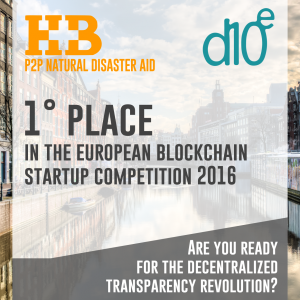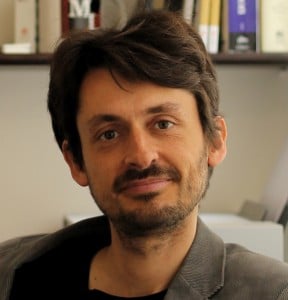An Interview with Guido Baroncini Turricchia, Founder of Helperbit
 Earlier this past month, blockchain startup Helperbit won the blockchain startup competition held at d10e, an international conference on decentralization in Amsterdam. The startup aims to change the way disaster relief funds are moved from donors to intended recipients by building a straightforward peer-to-peer donation system. This gives donors the ability to track where funds are sent and removes the need for third-party intermediaries.
Earlier this past month, blockchain startup Helperbit won the blockchain startup competition held at d10e, an international conference on decentralization in Amsterdam. The startup aims to change the way disaster relief funds are moved from donors to intended recipients by building a straightforward peer-to-peer donation system. This gives donors the ability to track where funds are sent and removes the need for third-party intermediaries.
CoinReport had the pleasure to speak with Guido Baroncini Turricchia, founder of Helperbit. Below we discuss how Helperbit works and the upcoming beta version that people are encouraged to participate in.
CoinReport: Can you tell us about your background? What got you interested in bitcoin and disaster relief?
Guideo: I am a 37-year-old environmental engineer. The use of technology to find solutions that bring equilibrium between people and nature is part of my university background. After university, I worked and studied in Ireland, the Netherlands and Spain, both in the private sector and as a researcher focusing on geographical information systems and remote sensing.
Some years ago I heard about bitcoin and I studied the technology for some weeks without interruption to understand the system better and theorize its potentiality. I believed that one of its less exploited functions was the opportunity to offer a public, independent and transparent accountability system of transaction. In which sectors can these features bring maximum benefits? In frameworks where money is managed by third parties: government and charities. The first would have needed a longer process to have been positive hacked, so I decided to dedicate my time in a sector that is perfectly related to my background: disaster relief.
CoinReport: Can you give us an overview of Helperbit? How does it work?
Guido: Helperbit is a platform that uses blockchain to offer a solution to issues linked with the management of funds addressed to humanitarian emergencies, such as inefficiencies and opacities. The platform allows users to donate using a fast and transparent P2P system that reduces the number of intermediaries and cuts the transaction costs, thanks to the features of the blockchain technology. Donors have the opportunity to track how their money is spent through a detailed audit of the economic flows.
CoinReport: Can you tell us more about the team working on Helperbit? How many people are involved?
Guido: We started to work remotely in different Italian region (Lazio, Piemonte and Sardegna). Now there are 7 people involved: Davide Gessa (Leader Dev.), Davide Menegaldo (COO) and myself are working full time at the project in Barcelona; while Vincenzo Aguì (Security manager), Roberto Tudini (CFO), Gianluca Carbone (GIS Dev. on behalf of In-Time Tor Vergata University of Rome) and Luigi Angotzi (Business dev.) are working on Helperbit part time in Italy.
CoinReport: I saw that you also have listings on AngelList, what has the reaction been from the cryptocurrency community so far?
Guido: I presented the project several times at some bitcoin meetups and science conferences. While it needs a bit of time for non-bitcoin experts to immediately understand Helperbit’s advantages, with a short intro to blockchain technology and a full explanation the project becomes clearer and the audience always appreciates it and supports us.
CoinReport: What did you do to prepare for the competition? How were winners selected/judged?
Guido: d10e, the international conference on decentralization held for the first time in Europe, opened some months ago an application for the blockchain startup competition. Some days before the event the organization team contact us with the good news: we were invited to the final pitch competition in Amsterdam.
There were four finalists out of three dozen of applications, including niche projects like Pax, a peer to peer legal system powered by Ethereum and Echo. The competition had three judges: Mali Marafini (Interruptiv), Jamie Burke (OutlierVentures.io) and David Orban (Network Society). The evaluation of the winner was based on business model, customer validation, execution and design.
CoinReport: How does it feel winning the European Blockchain Startup Competition?
Guido: That moment was awesome! I remember it put me in super good mood 🙂 When I heard the name of the winner I immediately shared the news through Telegram to my girlfriend and colleagues, all of us were excited.
CoinReport: Now that Helperbit has won, what are your next steps?
Guido: Our main targets are the following:
- Work on the release of the private beta. We need to improve the platform before the release of the first live version. A call to action for the readers of CoinReport is to subscribe to our landing page and be the first to use the beta version, helping us with advices.
- Raise money for the next year of development
- Build study case along the year to prove our concept
- Develop the best solutions to interact with people and organizations.
Those interested in participating in the Helperbit beta can sign up here.
Images courtesy of Helperbit










